|
MEMORANDUM OF POINTS AND AUTHORITIES
introduction
The Official Committee (the "Committee") of Unsecured Creditors
of Megafoods Stores, Inc., Handy Andy, Inc., Megafoods Real Estate, Inc.
and Texas National Food Store Leasing, Inc. (collectively, the "Debtors"),
appointed by the United States Trustee (the "Trustee") on August
18, 1994, of PaineWebber Incorporated ("PaineWebber"), and of
Alliance Corporate Finance Group Incorporated ("Alliance") (acting
on behalf of The Equitable Life Assurance Society of the United States
("Equitable")) (collectively, PaineWebber and Alliance are referred
to herein as the "Bondholders"), as individual members of the
Committee, submit this "Memorandum of Points and Authorities in Support
of the Motion of the Official Committee of Unsecured Creditors, of PaineWebber
Incorporated, and of Alliance Corporate Finance Group Incorporated (on
behalf of Equitable Life Assurance Society of the United States), for
an Order Approving Specified Information Blocking Procedures And Permitting
Securities Trading In Certain Circumstances" (the "Motion").
The Debtors.
The Debtors commenced their reorganization case on August
17, 1994, by filing a voluntary petition under the Bankruptcy Code. Megafoods
Stores, Inc. filed a motion with this Court to jointly administer its
case with that of Megafoods Real Estate, Inc., Handy Andy, Inc., and Texas
National Food Store Leasing Co. The administrative consolidation motion
was granted by this Court on September 7, 1994. The Debtors have continued
to operate their businesses as debtors-in-possession pursuant to Bankruptcy
Code §§ 1107(a) and 1108.
Pursuant to Bankruptcy Code § 1102(a)(1), the United
States Trustee for the District of Arizona appointed the Committee on
August 18, 1994, to represent the interests of the Debtors' unsecured
creditors. A copy of the United States Trustee's Appointment of Committee
of Unsecured Creditors is attached hereto as Exhibit 1. Paul Phaneuf,
First Vice President of the High Yield Capital Markets Division of PaineWebber
("Phaneuf"), was appointed to represent PaineWebber on the Committee.
See Declaration of Phaneuf (the "Phaneuf Declaration"),
¶ 3, attached hereto. Kate Kutasi, an investment officer of Equitable
and a Managing Director of Alliance "Kutasi"), was appointed
to represent Equitable on the Committee. See Declaration of Kutasi
(the "Kutasi Declaration"), ¶ 3, attached hereto.
The Information Blocking Procedures.
Alliance.
Alliance proposes that the information blocking procedures
("IBP") that
|

